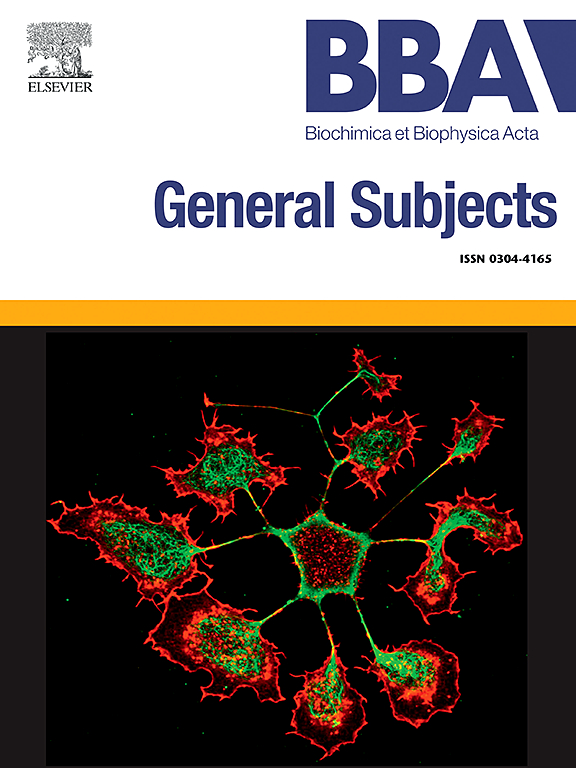Pharmacological role of MLN4924 in cisplatin-induced acute kidney injury
IF 2.2
3区 生物学
Q3 BIOCHEMISTRY & MOLECULAR BIOLOGY
Biochimica et biophysica acta. General subjects
Pub Date : 2025-07-13
DOI:10.1016/j.bbagen.2025.130842
引用次数: 0
Abstract
Background
Cisplatin-induced acute kidney injury (Cis-AKI) is a major complication that limits the clinical use of cisplatin, largely due to its cytotoxic effects on renal tubular epithelial cells. Recent studies have shown that MLN4924, a NEDD8-activating enzyme inhibitor, can modulate key cellular processes such as apoptosis, autophagy, and DNA damage repair. However, its precise role and regulatory mechanisms in the context of Cis-AKI remain largely undefined.
Purpose
This study aimed to elucidate the renoprotective mechanisms of MLN4924 in Cis-AKI.
Materials and methods
A cisplatin-induced nephrotoxicity mouse model and a human renal tubular epithelial (HK−2) damage cellular model were established. Kidney injury was evaluated by histopathology and RNA-sequencing. To explore whether MLN4924 alleviates Cis-AKI via modulation of the p53 and MAPK pathways, we analyzed pathway-specific regulatory changes in response to MLN4924 treatment.
Results
Compared to the group exposed to cisplatin, MLN4924 mitigated the pathological alterations and reduced the expression of molecules associated with renal injury. RNA-sequencing analysis indicated that the p53 and MAPK signaling pathways were inhibited by MLN4924 treatment compared to the cisplatin-exposed group. Moreover, silencing p53 or p38 exacerbates the renal protection conferred by MLN4924 in cisplatin-treated HK-2 cells, while their activation abolishes this effect. Mechanically, p38 activity promoted p53-dependent nephrotoxicity by increasing p53 expression.
Conclusions
MLN4924 exhibits a protective effect against Cis-AKI, as evidenced by inhibition of p53 and MAPK signaling pathways. These results suggest that MLN4924 holds potential as an adjuvant therapeutic agent in the treatment of kidney diseases associated with chemotherapy.

MLN4924在顺铂致急性肾损伤中的药理作用
顺铂诱导的急性肾损伤(Cis-AKI)是限制顺铂临床应用的主要并发症,主要是由于其对肾小管上皮细胞的细胞毒性作用。最近的研究表明,nedd8激活酶抑制剂MLN4924可以调节细胞凋亡、自噬和DNA损伤修复等关键细胞过程。然而,其在Cis-AKI中的确切作用和调控机制在很大程度上仍未明确。目的探讨MLN4924在Cis-AKI中的肾保护机制。材料和方法建立顺铂所致肾毒性小鼠模型和人肾小管上皮(HK−2)损伤细胞模型。通过组织病理学和rna测序评估肾损伤。为了探讨MLN4924是否通过调节p53和MAPK通路来缓解Cis-AKI,我们分析了MLN4924治疗后通路特异性的调控变化。结果与顺铂暴露组相比,MLN4924减轻了肾损伤的病理改变,降低了肾损伤相关分子的表达。rna测序分析表明,与顺铂暴露组相比,MLN4924治疗抑制了p53和MAPK信号通路。此外,在顺铂治疗的HK-2细胞中,沉默p53或p38会加重MLN4924赋予的肾脏保护作用,而它们的激活则会消除这种作用。机械上,p38活性通过增加p53表达促进了p53依赖性肾毒性。结论smln4924通过抑制p53和MAPK信号通路,对Cis-AKI具有保护作用。这些结果表明,MLN4924有潜力作为化疗相关肾脏疾病的辅助治疗剂。
本文章由计算机程序翻译,如有差异,请以英文原文为准。
求助全文
约1分钟内获得全文
求助全文
来源期刊

Biochimica et biophysica acta. General subjects
生物-生化与分子生物学
CiteScore
6.40
自引率
0.00%
发文量
139
审稿时长
30 days
期刊介绍:
BBA General Subjects accepts for submission either original, hypothesis-driven studies or reviews covering subjects in biochemistry and biophysics that are considered to have general interest for a wide audience. Manuscripts with interdisciplinary approaches are especially encouraged.
 求助内容:
求助内容: 应助结果提醒方式:
应助结果提醒方式:


